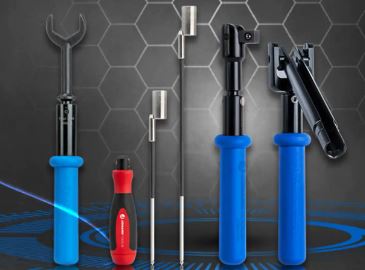


Jonard Tools offers industry leading torque wrenches designed for CATV, VDV, and Satellite applications.
In the world of installation, assembly, and repair, perfection is everything. Whether you are connecting coaxial cables for broadband service, maintaining electrical panels, or assembling complex machinery, the right amount of torque makes all the difference.
This is where torque wrenches come into play. These powerful yet simple tools are built to ensure that fasteners like bolts and nuts are tightened with the perfect amount of force not too tight, not too loose.
For professionals working in CATV, telecom, fiber optics, and electrical industries, torque wrenches are not just helpful, they’re absolutely essential.
What Is a Torque Wrench and Why Is It Used?
A torque wrench is a hand tool used to apply a specific amount of torque to a fastener such as a bolt or a nut. Torque is the force that causes rotation. If you overtighten a connection, you may strip threads, deform parts, or cause damage. If you under tighten it, the connection could become loose and fail during operation.
This tool ensures,
It’s especially useful in fields where accuracy is vital, such as
When you are working with coaxial connectors, fiber optic panels, or electrical terminals, the exact torque ensures that components are connected correctly and won’t be compromised over time.
Consequences of Improper Torque
Here’s why using a torque wrench is not just optional, it’s critical.
In short, improper torque leads to real problems, and in many cases, expensive repairs or service calls. That’s why more professionals are choosing torque limiting tools for perfect work.
Types of Torque Wrenches, Choose the Right One
Let’s explore the main types of torque wrenches and where they are used
The most common torque wrench. You preset the torque value, and the tool emits a “click” when the desired torque is reached. It’s ideal for general use and trusted by mechanics, electricians, and telecom installers.
This basic wrench uses a pointer that moves across a scale as you apply torque. It’s durable and simple but requires visual attention during use.
Advanced tools that show torque digitally, often with programmable memory. Ideal for settings where documentation and accuracy are mandatory like aerospace or medical device assembly.
An angle torque wrench goes beyond measuring torque alone, it also measures the angle of rotation. Used in applications like engine assembly where bolts need to be tightened to a torque, and then turned an accurate number of degrees.
Designed specifically for telecom and CATV use. A coax torque wrench is preset to apply the correct torque to F connectors, BNC connectors, or N type connectors. This ensures consistent signal quality and prevents connector damage.
Understanding Torque Wrench Sockets
A torque wrench is only as good as the socket that transfers the torque. That’s why torque wrench sockets are critical.
These sockets,
For field technicians working with telecom or electrical systems, having the correct torque wrench socket reduces errors and improves speed.
Applications Across Industries
Torque wrenches are used across many sectors. Here’s where they truly shine,
Why Choose Jonard Torque Wrenches?
Jonard Tools offers a line of torque wrenches engineered for professionals in the field. Our tools are
Whether you need a general purpose click type wrench or a specialized coax torque wrench, Jonard’s tools give you the reliability and control that your work demands.
Best Practices for Using a Torque Wrench
To ensure your torque wrench performs at its best,
Following these steps can extend the life of your tools and protect your work quality.
Common Mistakes to Avoid
Avoid these torque wrench errors
Small mistakes like these can lead to big problems. Always double check your tools before working on mission critical tasks.
Conclusion, Accuracy That Builds Confidence
Whether you are connecting a coax cable on a rooftop, tightening bolts in a control panel, or assembling machinery, the need for accuracy is fixed. Torque wrenches, especially specialized ones like the angle torque wrench or coax torque wrench, helps ensure every connection is correct, secure, and long lasting.
In technical fields, torque is not just a measurement, it’s your reputation. A poorly torqued fastener can cause downtime, safety issues, or total failure. A properly torqued one delivers peace of mind and professional results.
Find the Right Torque Wrench for the Job
Ready to level up your toolkit? Jonard Tools offers top quality well designed torque wrenches that help you work smarter, safer, and faster.
Click here to explore our full range of torque wrenches and torque wrench sockets today
